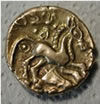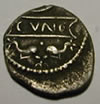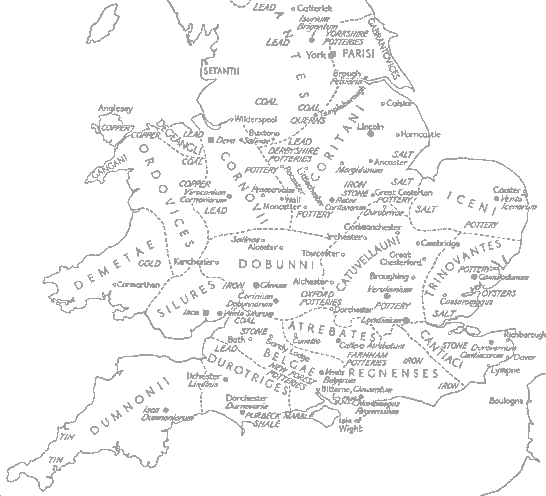|
The name Celt originated with the ancient Greeks,
who called the barbarian peoples of central Europe Keltoi. Rather that
being a broad cultural genetic 'race,' the Celts were a broad cultural-linguistic
group. The area where they lived became a constantly changing collection
of tribal 'nations.' The Celts were never an 'empire' ruled by one government.
The ancestors of the Celts were the people of the Urnfield culture,
so-called because they  buried
their dead in cremation urns in flat ground. Between 1200 and 700 BC,
they spread westward from their eastern European homeland into the area
of modern Austria, Germany, Switzerland, and France. Here, there culture
developed into a recognizably Celtic form. The earliest stage of Celtic
culture is called the Hallstatt, after a village in the Austrian Salzkammergut
where archeologists discovered important artifacts. At hallstatt and
other places with the 'hall' (salt) name - Hallein, Helle, Schwabisch
Hall - the Celts' wealth was based upon salt extraction and sale. The
technology of iron, too, was embraced by innovative Celtic blacksmiths,
who produced the best metal in Europe, that was in great demand outside
Celtic Areas. An important two-way trade developed between the Celts
and the Greeks, both in their homeland, and their colonies inwhat is
now southern France. buried
their dead in cremation urns in flat ground. Between 1200 and 700 BC,
they spread westward from their eastern European homeland into the area
of modern Austria, Germany, Switzerland, and France. Here, there culture
developed into a recognizably Celtic form. The earliest stage of Celtic
culture is called the Hallstatt, after a village in the Austrian Salzkammergut
where archeologists discovered important artifacts. At hallstatt and
other places with the 'hall' (salt) name - Hallein, Helle, Schwabisch
Hall - the Celts' wealth was based upon salt extraction and sale. The
technology of iron, too, was embraced by innovative Celtic blacksmiths,
who produced the best metal in Europe, that was in great demand outside
Celtic Areas. An important two-way trade developed between the Celts
and the Greeks, both in their homeland, and their colonies inwhat is
now southern France.
By the seventh century BC, the Hallstatt
people had become prosperous in the salt and iron businesses. In  around
650 BC, the Celts began to re-exchange raids with the Greeks and Etruscans,
elements of whose culture they adopted. By adding and adapting Graeco-Etruscan
elements to the Hallstatt culture, the characteristically Celtic style
of art came into being. As a result of this, in northeastern France,
Switzerland, and the middle Rhine, a new stage of Celtic development
took place. around
650 BC, the Celts began to re-exchange raids with the Greeks and Etruscans,
elements of whose culture they adopted. By adding and adapting Graeco-Etruscan
elements to the Hallstatt culture, the characteristically Celtic style
of art came into being. As a result of this, in northeastern France,
Switzerland, and the middle Rhine, a new stage of Celtic development
took place.
Archeologists call it the early La Tene period,
after the definitive artifacts found at La Tene, on Lake Neuchatel in
Switzerland. During the Classical period of Greece and Rome, Celtic
culture was predominant north of the Alps. Celtic technicians of the
La Tene period were technically superior to their Greek and Roman counterparts.
Their superior weaponry, including a new type of sword, chain mail,
and chariots, enabled the Celts to mount miliatary expiditions against
neighboring tribes and nations, including the Greeks and Romans. Celtic
fighting men had such a good reputation that they were in great demand
as mercenareis. The warrior culture was at the heart of Celtic society,
as the heroic sagas of ancient Ireland record.
 Partly
as the result of wars, many Celtic tribes migrated from one region of
Europe to another. From their homeland in central Europe, the Celts
spread westward into modern France and the British Isles, southwest
into Iberia, southward into northern Italy, and eastward through central
Europe into the Balkans and Asia Minor. Ancient tribes now thought to
be Celtic include the Helvetii, who lived in the area of modern Switzerland,
the Boii in modern Italy, the Averni in modern France, the Scordisci
in modern Serbia, and the Belgae, who inhabited northern Gaul and southern
Britain in immediate pre-Roman times. Partly
as the result of wars, many Celtic tribes migrated from one region of
Europe to another. From their homeland in central Europe, the Celts
spread westward into modern France and the British Isles, southwest
into Iberia, southward into northern Italy, and eastward through central
Europe into the Balkans and Asia Minor. Ancient tribes now thought to
be Celtic include the Helvetii, who lived in the area of modern Switzerland,
the Boii in modern Italy, the Averni in modern France, the Scordisci
in modern Serbia, and the Belgae, who inhabited northern Gaul and southern
Britain in immediate pre-Roman times.
However. After the first century BC, they were
in retreat. Driven out of eastern Europe by Slavic tribes, they were
vanquished in the west by superior Roman forces. First the Celts in
northern Italy came under Roman rule. Then they were overwhelmed in
the rest of Gaul (modern France), modern Switzerland, southern Germany,
and Austria. Perhaps as the result of the Romans' pressure, many of
the Belgae emigrated from what is now  Belgium to southern Britain in the first century BC. Then, during the
first centruey AD, most of Britain fell to the Roman conquerors. In
the third century AD, the Celts of southern Germany were overrun by
the conferderation of Germanic tribes called the Alamanni. Since then,
many centuries have passed, with further inroads into Celtic lands by
invaders, yet Celtic culture has never been eliminated from Europe and
will no doubt continue to thrive well into the next millennium. Today,
Celtic culture is the living heritage of Ireland, Wales, Scotland, Cornwall,
the Isle of Man, and Brittany. It has also left its mark on English
and French custom and tradition.
Belgium to southern Britain in the first century BC. Then, during the
first centruey AD, most of Britain fell to the Roman conquerors. In
the third century AD, the Celts of southern Germany were overrun by
the conferderation of Germanic tribes called the Alamanni. Since then,
many centuries have passed, with further inroads into Celtic lands by
invaders, yet Celtic culture has never been eliminated from Europe and
will no doubt continue to thrive well into the next millennium. Today,
Celtic culture is the living heritage of Ireland, Wales, Scotland, Cornwall,
the Isle of Man, and Brittany. It has also left its mark on English
and French custom and tradition.

|





 buried
their dead in cremation urns in flat ground. Between 1200 and 700 BC,
they spread westward from their eastern European homeland into the area
of modern Austria, Germany, Switzerland, and France. Here, there culture
developed into a recognizably Celtic form. The earliest stage of Celtic
culture is called the Hallstatt, after a village in the Austrian Salzkammergut
where archeologists discovered important artifacts. At hallstatt and
other places with the 'hall' (salt) name - Hallein, Helle, Schwabisch
Hall - the Celts' wealth was based upon salt extraction and sale. The
technology of iron, too, was embraced by innovative Celtic blacksmiths,
who produced the best metal in Europe, that was in great demand outside
Celtic Areas. An important two-way trade developed between the Celts
and the Greeks, both in their homeland, and their colonies inwhat is
now southern France.
buried
their dead in cremation urns in flat ground. Between 1200 and 700 BC,
they spread westward from their eastern European homeland into the area
of modern Austria, Germany, Switzerland, and France. Here, there culture
developed into a recognizably Celtic form. The earliest stage of Celtic
culture is called the Hallstatt, after a village in the Austrian Salzkammergut
where archeologists discovered important artifacts. At hallstatt and
other places with the 'hall' (salt) name - Hallein, Helle, Schwabisch
Hall - the Celts' wealth was based upon salt extraction and sale. The
technology of iron, too, was embraced by innovative Celtic blacksmiths,
who produced the best metal in Europe, that was in great demand outside
Celtic Areas. An important two-way trade developed between the Celts
and the Greeks, both in their homeland, and their colonies inwhat is
now southern France. around
650 BC, the Celts began to re-exchange raids with the Greeks and Etruscans,
elements of whose culture they adopted. By adding and adapting Graeco-Etruscan
elements to the Hallstatt culture, the characteristically Celtic style
of art came into being. As a result of this, in northeastern France,
Switzerland, and the middle Rhine, a new stage of Celtic development
took place.
around
650 BC, the Celts began to re-exchange raids with the Greeks and Etruscans,
elements of whose culture they adopted. By adding and adapting Graeco-Etruscan
elements to the Hallstatt culture, the characteristically Celtic style
of art came into being. As a result of this, in northeastern France,
Switzerland, and the middle Rhine, a new stage of Celtic development
took place. Partly
as the result of wars, many Celtic tribes migrated from one region of
Europe to another. From their homeland in central Europe, the Celts
spread westward into modern France and the British Isles, southwest
into Iberia, southward into northern Italy, and eastward through central
Europe into the Balkans and Asia Minor. Ancient tribes now thought to
be Celtic include the Helvetii, who lived in the area of modern Switzerland,
the Boii in modern Italy, the Averni in modern France, the Scordisci
in modern Serbia, and the Belgae, who inhabited northern Gaul and southern
Britain in immediate pre-Roman times.
Partly
as the result of wars, many Celtic tribes migrated from one region of
Europe to another. From their homeland in central Europe, the Celts
spread westward into modern France and the British Isles, southwest
into Iberia, southward into northern Italy, and eastward through central
Europe into the Balkans and Asia Minor. Ancient tribes now thought to
be Celtic include the Helvetii, who lived in the area of modern Switzerland,
the Boii in modern Italy, the Averni in modern France, the Scordisci
in modern Serbia, and the Belgae, who inhabited northern Gaul and southern
Britain in immediate pre-Roman times. Belgium to southern Britain in the first century BC. Then, during the
first centruey AD, most of Britain fell to the Roman conquerors. In
the third century AD, the Celts of southern Germany were overrun by
the conferderation of Germanic tribes called the Alamanni. Since then,
many centuries have passed, with further inroads into Celtic lands by
invaders, yet Celtic culture has never been eliminated from Europe and
will no doubt continue to thrive well into the next millennium. Today,
Celtic culture is the living heritage of Ireland, Wales, Scotland, Cornwall,
the Isle of Man, and Brittany. It has also left its mark on English
and French custom and tradition.
Belgium to southern Britain in the first century BC. Then, during the
first centruey AD, most of Britain fell to the Roman conquerors. In
the third century AD, the Celts of southern Germany were overrun by
the conferderation of Germanic tribes called the Alamanni. Since then,
many centuries have passed, with further inroads into Celtic lands by
invaders, yet Celtic culture has never been eliminated from Europe and
will no doubt continue to thrive well into the next millennium. Today,
Celtic culture is the living heritage of Ireland, Wales, Scotland, Cornwall,
the Isle of Man, and Brittany. It has also left its mark on English
and French custom and tradition.